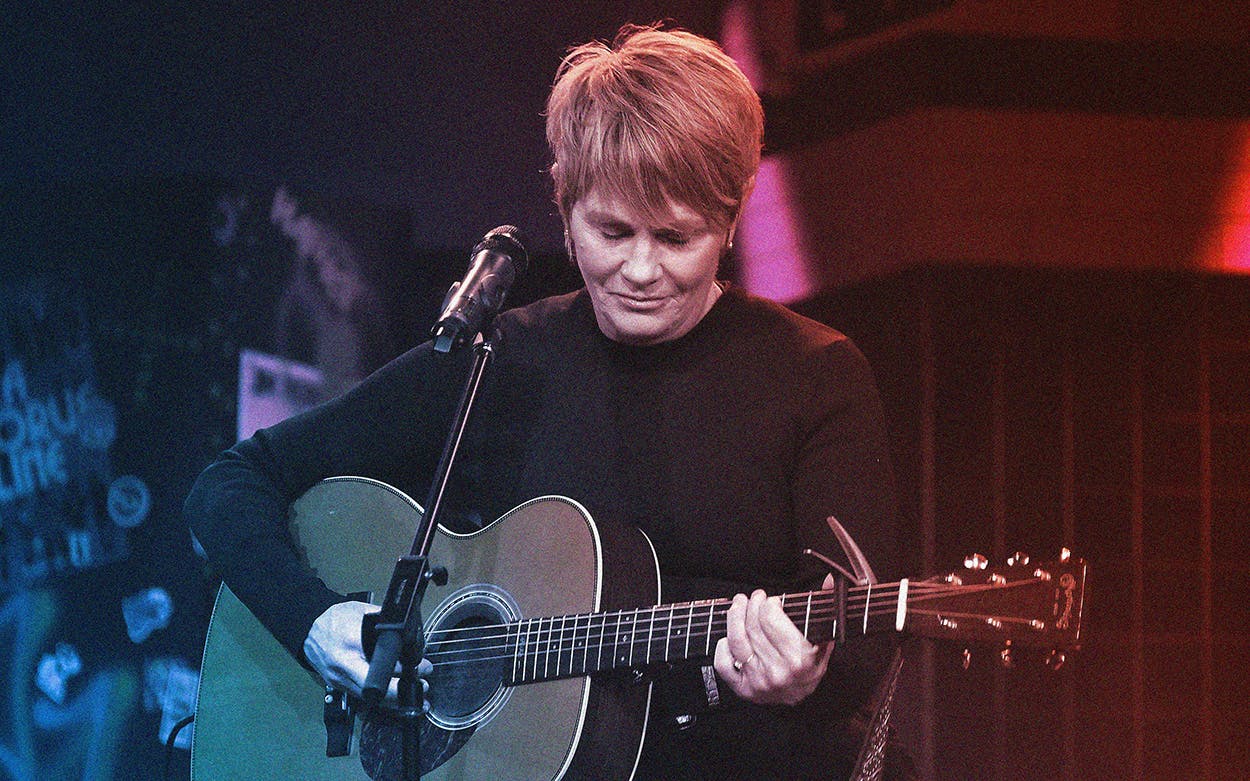Subscribe
Later this month, Shawn Colvin will be inducted into the Austin City Limits Hall of Fame alongside Lyle Lovett and Buddy Guy. Her longtime friend Jackson Browne, Bruce Hornsby, and Wimberley native Sarah Jarosz will perform in honor of the Grammy-winning singer-songwriter at ACL’s sixth annual hall of fame celebration. The ceremony comes on the heels of last month’s release of a new acoustic version of her debut album, Steady On, designed to mark its thirtieth anniversary. The original LP earned Colvin her first Grammy, establishing her as a rising star in the folk and acoustic world and setting the stage for a pop crossover three albums later. In 1996, she won a pair of big-category Grammys—Song of the Year and Record of the Year—for her hit single “Sunny Came Home.” In 2012, the Austinite added author to her resume with a memoir, Diamond in the Rough, a survival story that unapologetically addresses her struggles with anorexia, clinical depression, and addiction. On this episode of the National Podcast of Texas, Colvin addresses each of those hurdles and what she sees as her legacy in a very different music world than the one she first stepped into more than thirty years ago.
1. “Sunny Came Home,” Colvin’s biggest hit and the song responsible for two of her three Grammy wins, came after she stopped worrying about crafting a radio-friendly single.
“By the time of A Few Small Repairs, I’d made three records, and Columbia had looked for a hit—a single—on each one of them. And I compromised on some of the production for those songs in an effort to appease them. I said, ‘Okay. What’s wrong with a hit? I’ll bend a little.’ And nothing ever happened. There was a song, “I Don’t Know Why,” on Fat City that started as a simple folk song. I wrote it on acoustic guitar solo, but “Nothing Compares To U” by Sinead O’Connor was huge. So they put a synth pad and lots of bells and whistles, and it didn’t go anywhere. So by the time John Leventhal and I got to A Few Small Repairs, we said the the heck with it. We said, ‘We’re not going to think about addressing radio, we’re just going to give them the record. We won’t cry if something addresses radio, and we think we have songs that are capable of that, but that’s the last thing we’re going to think about.’ And then the irony of course, is I had a hit. A huge hit.”
2. Although she says she was initially nervous about how the book would be received, Colvin says she has zero regrets about detailing her personal struggles in Diamonds in the Rough.
“What made a huge difference for me when I got sober, which is really the biggest turning point in my life, was that people who were suffering from what I was suffering from were willing to talk about it. And it wasn’t a psychologist or a doctor or someone who considered themselves an expert. It was people that were alcoholics that were willing to tell their story and were getting better. Nothing filled me with more hope than that. And same with depression. I remember reading, when I was in a pretty bad way, William Styron’s Darkness Visible. It was someone who had been where I’d been and where I was and where I was afraid I might be and describe the suffering and came out of it. So I figured if there’s one service I can do, it’s to be honest about that stuff because people who had gone through it and talked honestly about it made all the difference to me. So that’s what I have to give.”
3. At age 63, and still working in a male-dominated music industry, Colvin’s well aware she’s entered a different phase of her career, whether she likes it or not.
“It’s a little bittersweet to be the elder statesman, but it’s nature of the business. I consider myself enormously lucky. I have a career, and a lot of my contemporaries don’t necessarily have them. I can sell tickets, and that’s my career. So I’m immensely grateful for that. But how relevant am I in what is popular at the moment or cutting edge? But it’s not fun feeling less relevant, and especially as an older woman, you can feel invisible in this society, in this culture, to men. I notice the difference in how men look at me, and that’s painful, and it’s not right. In our culture and this business, women my age are perceived as over the hill and past their best days, and that’s not true or even true in every culture.”






